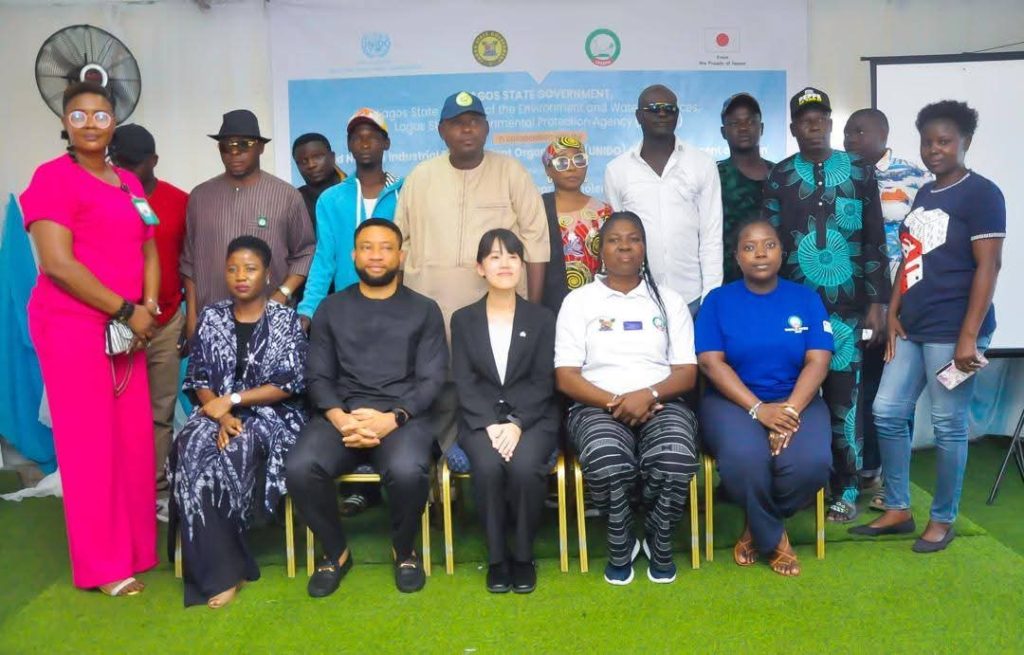In a proactive move to mitigate potential cholera outbreaks, particularly in its flood-prone regions, the Lagos State Environmental Protection Agency (LASEPA) partnered with the United Nations Industrial Development Organisation (UNIDO) and the Government of Japan to host a critical public awareness seminar.
The event, held recently at the Lagos City Centre in Sura, Lagos Island, focused on sensitising informal food and water vendors, alongside waste workers, groups identified as crucial in the transmission cycle of the disease.
The seminar falls under UNIDO Project 240236, an initiative specifically titled: ‘Emergency Capacity Building of Informal Food and Water Vendors and Waste Workers in Flood-Affected Lagos to Combat Cholera Outbreaks.’
READ ALSO: Lagos ranked second-best nightlife city in Africa
Omobolaji Gaji, Permanent Secretary of the Office of Environmental Services, represented by Aina Falaye, emphasised the severe health risks associated with cholera during the event.
He outlined key symptoms such as profuse watery diarrhoea, vomiting, dehydration, and fatigue, cautioning that these can rapidly lead to death if not promptly addressed.
Gaji stressed that cholera is predominantly spread through contaminated food and water, highlighting the paramount importance of robust environmental sanitation, diligent personal hygiene, and safe practices in handling food and water.
His recommendations included boiling water before consumption, maintaining separation between cooked and raw foods, refrigerating perishable items, and properly disposing of spoiled goods.
He further underscored the value of waste management, noting that properly processed waste can be transformed into useful organic fertiliser, thereby discouraging careless disposal.
Gaji also encouraged the youth present to become advocates for change within their communities and urged all attendees to serve as trainers in their respective areas.
He charged them with containing their waste responsibly and managing floodwaters effectively, warning that stagnant water bodies are fertile grounds for disease outbreaks and environmental degradation.
Also, Tunde Ajayi, General Manager of LASEPA, clarified that this sensitisation initiative is part of an international collaboration with UNIDO, funded by the Japanese government.
He explained that following last year’s cholera outbreak, the state government sought UNIDO’s assistance to bolster its prevention efforts, especially in areas susceptible to flooding.
Ajayi noted that food and water vendors were pinpointed as key players in cholera transmission due to instances of using contaminated water in their preparations.
He added that the awareness campaign has already reached Ikorodu and Lagos Island, with plans to expand to other local government areas in the coming months.
More so, Fuka Furutani, Attaché for Development Cooperation at the Embassy of Japan in Nigeria, reaffirmed Japan’s dedication to supporting health resilience and sustainable development in Nigeria.
Commending the leadership of UNIDO and LASEPA, Furutani cited data indicating that Lagos State alone accounted for approximately 43% of all suspected cholera cases in Nigeria in 2024, reiterating Japan’s commitment to assisting vulnerable communities during health crises.
Charles Uzoma, UNIDO Field Coordinator, provided an overview of the project’s scope and anticipated impact.
READ ALSO: Sanwo-Olu renews demand for special status for Lagos at constitution review hearing
He highlighted that Lagos experiences annual cholera outbreaks, attributing these to factors such as recurring flooding, climate change impacts, inadequate sanitation, and limited access to clean water.
While acknowledging the Federal Government’s introduction of oral cholera vaccines, Uzoma stressed that public awareness and hygiene education remain indispensable tools in the fight against the disease.



